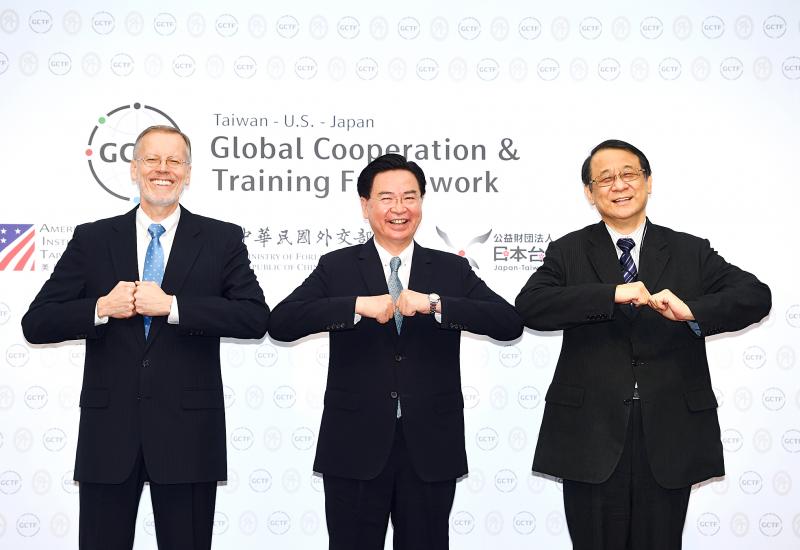Taiwan, the US and Japan yesterday issued a joint statement announcing that they would seek greater cooperation under the Global Cooperation and Training Framework (GCTF) as they marked its fifth anniversary.
In a statement signed by Minster of Foreign Affairs Joseph Wu (吳釗燮), American Institute in Taiwan (AIT) Director Brent Christensen and Japan-Taiwan Exchange Association Taipei Office Chief Representative Hiroyasu Izumi, the offices said that to bolster their partnership, they would be expanding the “frequency, size and scope of the GCTF workshops, including holding more events outside Taiwan,” as well as the “depth and breadth of participation from like-minded countries, including co-hosting programs.”
They would establish a GCTF task force as part of the ministry’s Department of North American Affairs to serve as the GCTF Secretariat, and a GCTF Alumni Network for former participants, the statement said.

Photo: Fang Pin-chao, Taipei Times
Christensen told a news conference that when the framework was established in 2015, the international community did not understand the wealth of professional knowledge and valuable experience Taiwan could provide.
Unlike symbolic international forums, the GCTF is focused and practical, he said, adding that it is focused on topics that are most in need of discussion and it creates tangible results.
The GCTF is free of political interference, and its only purpose is to allow professionals to benefit from Taiwan’s experience and expertise, he said.
The US looks forward to continuing to work with Japan and Taiwan, allowing the world to understand that Taiwan is a reliable partner, democratic role model and force for good, and allowing “real friends, real progress” — which describes Taiwan-US relations — to become the spirit of the cooperation with countries in the Indo-Pacific region, he said.
Izumi said that Japan, Taiwan and the US share the values of freedom, democracy and human rights.
Japan is honored to join the framework, he said.
Japan joined the GCTF as a partner last year.
The theme of the GCTF is practical and meets the needs of the different nations, he said.
Taiwan has received international praise for its fight against the novel coronavirus and made a greater contribution to international society, he said.
Workshops have been affected by the COVID-19 pandemic, he said, adding that they would continue to be held in more flexible ways.
A page dedicated to the framework is to be created on the association’s Web site, he said, adding that the Japanese government hopes to cooperate more actively with Taiwan.
Japan would not, and cannot, leave Taiwan, he said, adding that Japan and Taiwan must act together.
Wu welcomed more like-minded partners to join the platform.
AIT Deputy Director Raymond Green, Japan-Taiwan Exchange Association Deputy Representative Nishiumi Shigehiro, as well as representatives and deputy representatives from Canada, Sweden, Australia, the UK and New Zealand, were among the guests who attended the news conference.
Sweden and Australia have cohosted GCTF events, and the Netherlands is planning to join it.
The GCTF has held 23 international training programs in the areas of public health, women’s rights, energy security, information security and humanitarian aid, among others, inviting the participation of more than 500 government officials and experts from at least 38 nations.

The manufacture of the remaining 28 M1A2T Abrams tanks Taiwan purchased from the US has recently been completed, and they are expected to be delivered within the next one to two months, a source said yesterday. The Ministry of National Defense is arranging cargo ships to transport the tanks to Taiwan as soon as possible, said the source, who is familiar with the matter. The estimated arrival time ranges from late this month to early next month, the source said. The 28 Abrams tanks make up the third and final batch of a total of 108 tanks, valued at about NT$40.5 billion

Two Taiwanese prosecutors were questioned by Chinese security personnel at their hotel during a trip to China’s Henan Province this month, the Mainland Affairs Council (MAC) said yesterday. The officers had personal information on the prosecutors, including “when they were assigned to their posts, their work locations and job titles,” MAC Deputy Minister and spokesman Liang Wen-chieh (梁文傑) said. On top of asking about their agencies and positions, the officers also questioned the prosecutors about the Cross-Strait Joint Crime-Fighting and Judicial Mutual Assistance Agreement, a pact that serves as the framework for Taiwan-China cooperation on combating crime and providing judicial assistance, Liang

A group from the Taiwanese Designers in Australia association yesterday represented Taiwan at the Midsumma Pride March in Melbourne. The march, held in the St. Kilda suburb, is the city’s largest LGBTQIA+ parade and the flagship event of the annual Midsumma Festival. It attracted more than 45,000 spectators who supported the 400 groups and 10,000 marchers that participated this year, the association said. Taiwanese Designers said they organized a team to march for Taiwan this year, joining politicians, government agencies, professionals and community organizations in showing support for LGBTQIA+ people and diverse communities. As the first country in Asia to legalize same-sex

MOTIVES QUESTIONED The PLA considers Xi’s policies toward Taiwan to be driven by personal considerations rather than military assessment, the Epoch Times reports Chinese President Xi Jinping’s (習近平) latest purge of the Chinese People’s Liberation Army (PLA) leadership might have been prompted by the military’s opposition to plans of invading Taiwan, the Epoch Times said. The Chinese military opposes waging war against Taiwan by a large consensus, putting it at odds with Xi’s vision, the Falun Gong-affiliated daily said in a report on Thursday, citing anonymous sources with insight into the PLA’s inner workings. The opposition is not the opinion of a few generals, but a widely shared view among the PLA cadre, the Epoch Times cited them as saying. “Chinese forces know full well that